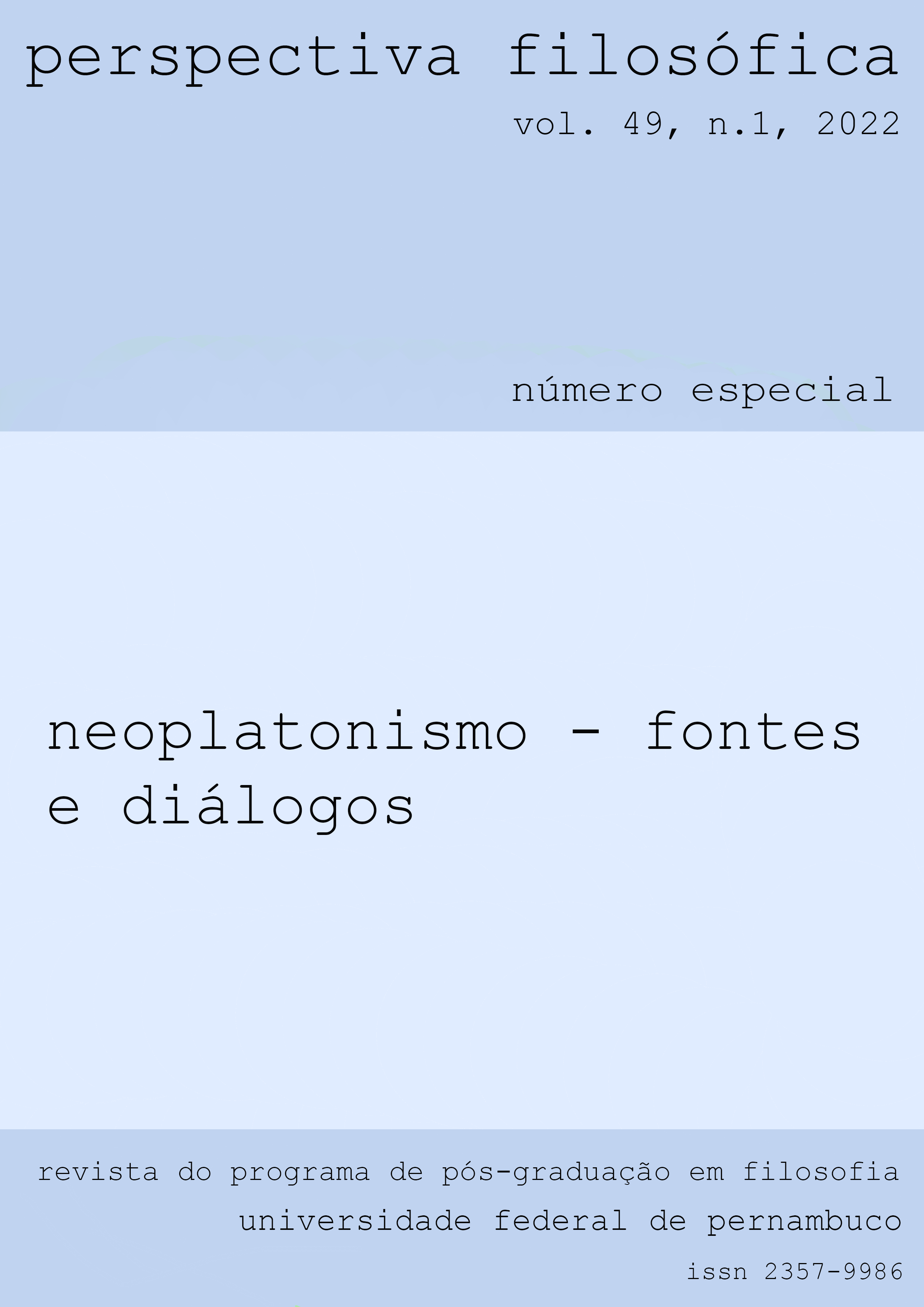The importance of Corpus Dionisyacum in life and work of Albert the Great
DOI:
https://doi.org/10.51359/2357-9986.2022.253147Keywords:
Corpus Dionisyacum, Albert the Great, medieval teaching of philosophy, mysticismAbstract
The Corpus Dionisyacum was the most fruitful and influential pseudoepigraphic treatise in the history of Western philosophical thought, together with the Liber de causis. After entering the Latin world and its successive translations, it became the instrumentum laboris of Parisian masters of the 13th century and was adopted by Alberto Magno as a teaching text in the Studium Generale of Cologne, paired with the Libri Quattuor Sententiarum by Pedro Lombardo and the Sacred Scriptures. The purpose of this article is to analyze the role that this set of manuscripts in ancient Greek played in the life and work of Alberto Magno, highlighting the influence on his thinking, on the method of teaching the Studium generale, as well as on the Dominican mystique of his province.References
ALBERTO MAGNO. Tratado sobre a Prudência. Tradução: M. Raschietti. São Paulo: Paulus, 2017.
ANZULEWICZ, H. RASCHIETTI, M. (trad.). “O Pseudo-Dionísio Areopagita e o Princípio Estrutural do pensamento de Alberto Magno”. In: Notandum, ano 24, n. 56, 2021, pp. 137-164.
ANZULEWICZ, H. “Albertus Magnus”. In: CÜPPERS, S. (Hg.) Kölner Theologen. Von Rupert von Deutz bis Wilhem Nyssen. Köln : Marzellen Verlag, 2004.
ANZULEWICZ, H. “Albertus Magnus um seine Schüler”. Versucht einer Verhältnisbestimmung. In: Andreas Speer / Thomas Jeschke (Hgg.): Schüler und Meister (Miscellanea Mediaevalia; Bd. 39). Berlin: de Gruyter, 2016
BOUGEROL, J. G. Introducción a San Buenaventura. Madrid: Ed. Catolica S.A., 1984.
BURGER, M. “Thomas Aquinas’ Glosses on the Dionysius Commentaries of Albert the Great in Codex 30 of the Cologne Catedral Library”. In: VIA ALBERTI. Texte – Quellen – Interpretationen. Edição: L. Honnefelder, H. Möhle, S. Bullido del Barrio (Subsidia Albertina 2). Münster: Aschendorff, 2009
CASTRO, R. C. G. Negatividade e participação: a influência do Pseudo Dionísio Areopagita em Tomás de Aquino – teologia, filosofia e educação. Tese de Doutorado em Educação. Programa de Pós-Graduação em Educação na Universidade de São Paulo. São Paulo, 2009.
DE LIBERA, A. Introduzione alla Mistica Renana. Da Alberto Magno a Meister Eckhart. Milano: Jaca Book, 1998.
DONDAINE, H. F. Le Corpus Dionysien de l'Université de Paris au XIIIe siècle. Roma: Edizioni di Storia e Letteratura, 1953.
DURANTEL, J. Saint Thomas et le Pseudo-Denis. Paris: Librairie Félix Alcan, 1919.
GAMBA, U. “Commenti latini al “De mystica theologia” del PseudoDionigi Areopagita fino al Grossatesta”. Aevum, anno 16, Fasc. 2/4 (AprileDicembre 1942).
GAMBA, U. “Roberto Grossatesta traduttore e commentatore del De Mystica Theologia del Pseudo-Dionigi Areopagita”. Aevum, ano 18, fasc. 1/4 (janeiro-dezembro 1944).
GILSON, E. A Filosofia na Idade Média. São Paulo: Martins Fontes, 2001.
GRABMANN, M. “Der Einfluss Alberts des Grossen auf das mittelalterliche Geistesleben”. Zeitschrift für katholische Theologie, Vol. 52, No. 2 (1928).
HUIZINGA, J. O outono da Idade Média. Estudo sobre as formas de vida e de pensamento dos séculos XIV e XV na França e nos Países Baixos. São Paulo: Cosac & Naify, 2010.
JEUNEAU, E. “Denys l’Areopagite promoteur du Néoplatinisme in Occident”. Néoplatinisme et philosophie médiévale: Actes du Colloque international de Corfou, 6-8 octobre 1995, édites para Linos G. Benakis.
LYRA, A. R. Nicolau de Cusa: visão de Deus e teoria do conhecimento. Tese de Doutorado em Ciências da Religião. Programa de Pós-Graduação em Ciências da Religião da PUC-SP, São Paulo, 2010
MEDIÆVALIA. TEXTOS E ESTUDOS. Pseudo-Dionísio Areopagita. Teologia Mística. Versão e estudo complementar de M. Santiago de Carvalho, n.10. Porto: Fundação Eng. Antônio de Almeida, 1996,
MÉLANGES MANDONNET. Ètudes d’histoire littéreaire et doctrinale du Moyen Age. Tome II. Paris : Librairie Philosophique J. Vrin, 1930.
MORESCHINI, C. Storia del pensiero tardo-antico.Milano: Bompiani,2013.
MULCHAHEY, M. “The Studium at Cologne and its role within the early Dominican education”. Listening, Vol. 43, 2008.
PALAZZO, A. “Ulrico di Strasburgo, un maestro nel citare. Nuove evidenze del ricorso alle opere di Alberto il Grande in De summo IV 2 8-14”. In: MEROI, F. (org.). Le parole del pensiero. Studi offerti a Nestore Pirillo. Pisa: Edizioni ETS, 2013
PROCLO. Tria opuscola. Provvidenza, libertà male. Organização: F. De Paparella. Texto latim e grego. Milano: Bompiani, 2004.
PSEUDO-DIONÍSIO AREOPAGITA. Dos nomes divinos. Introdução, tradução e notas: Bento Silva Santos. São Paulo: Attar Editorial, 2004.
RIBEIRO DO NASCIMENTO, C. A. Santo Tomás de Aquino. O boi mudo da Sicília. São Paulo: Educ, 1992.
ROREM, P. Pseudo-Dionysius. A Commentary on the Texts and an Introduction to Their Influence. New York/Oxford: Oxford University Press, 1993.
RUH, K. Storia della mistica occidentale. Le basi patristiche e la teologia monastica del XII secolo. Milano: Vita e Pensiero.
SENNER, W. “Die rheinischen studia der Dominikaner im Mittelalter: Alternative und Vorläufer der universitates studiorum”. In: CESALLI, L. -GERMANN, N. - HOENEN, M. J. F. M. (eds.). University, Council, City. Intellectual Culture on the Rhine (1300-1550). (Rencontres de Philosophie Médiévale 13). Turnhout (Bélgica): 2007.
TORRELL, J.-P. Iniciação a Santo Tomás de Aquino. São Paulo: Loyola, 1998.
THÉRY, G. L’entrée du Pseudo-Denys en Occident. In: MÉLANGES MANDONNET. Ètudes d’histoire littéreaire et doctrinale du Moyen Age. Tome II. Paris : Librairie Philosophique J. Vrin, 1930
Downloads
Published
Issue
Section
License
A Revista Perspectiva Filosófica orienta seus procedimentos de gestão de artigos conforme as diretrizes básicas formuladas pelo Conselho Nacional de Desenvolvimento Científico e Tecnológico (CNPq). http://www.cnpq.br/web/guest/diretrizesAutores que publicam nesta revista concordam com os seguintes termos:
Os autores mantém os direitos autorais e concedem à revista o direito de primeira publicação, sendo o trabalho simultaneamente licenciado sob https://creativecommons.org/licenses/by/4.0/deed.pt_BR que permite o compartilhamento do trabalho com reconhecimento da autoria e publicação inicial nesta revista.
Os autores têm autorização para assumir contratos adicionais separadamente, para distribuição não-exclusiva da versão do trabalho publicada nesta revista, com reconhecimento de autoria e publicação inicial nesta revista (Consultar http://opcit.eprints.org/oacitation-biblio.html).

Esta revista está licenciada com uma Licença Creative Commons Atribuição 4.0 Internacional.













